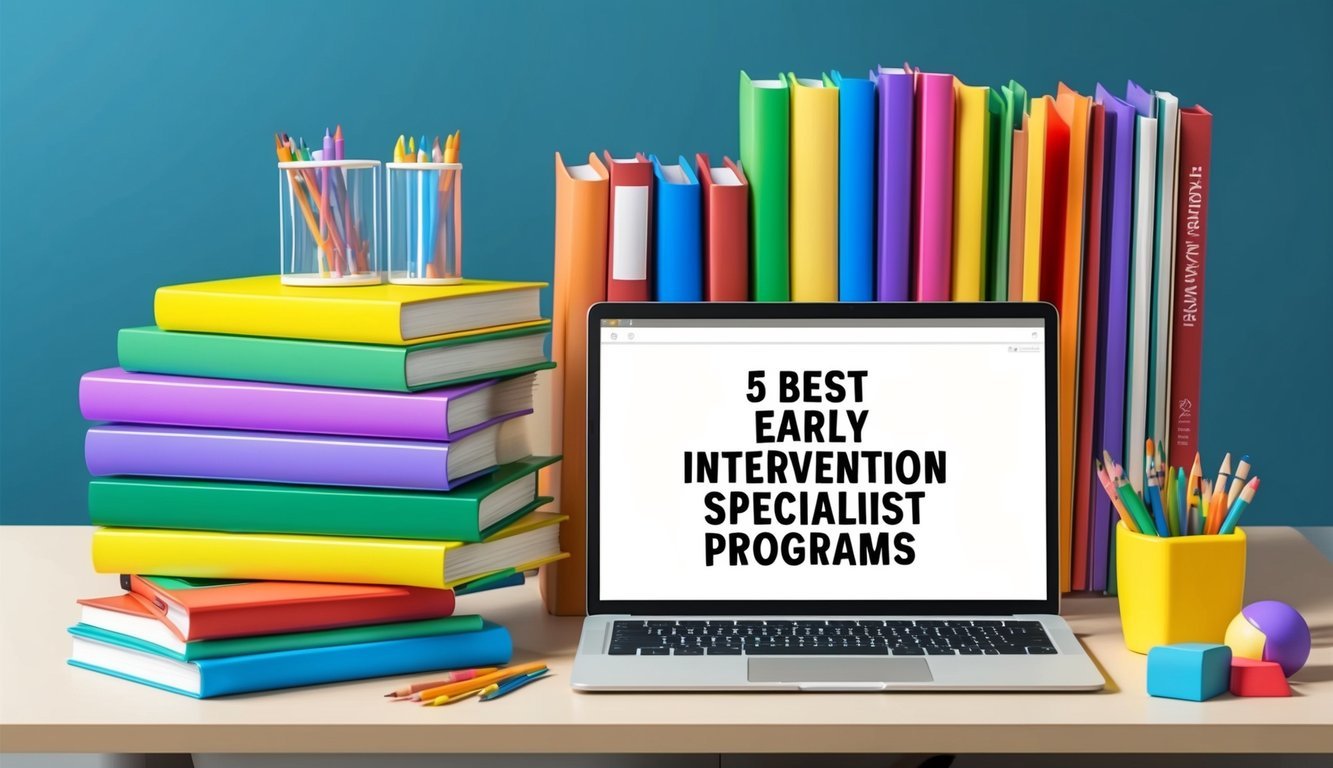Hey there! If you’re considering a career that truly makes a difference in the lives of young children, early intervention specialists are the unsung heroes working tirelessly to help kids with developmental delays.
These dedicated professionals dive into the world of babies and toddlers, helping them build essential skills from a young age.
And let’s be honest—getting quality training is a must for this fulfilling path.

If you’re aiming to become an early intervention specialist, choosing a solid program is key.
The best ones offer hands-on experience and teach the latest methods to support these little ones on their journey.
You’ll also learn to collaborate with families and other professionals to give kids a head start that truly matters.
1) Speech Pathology Masters Program at Vanderbilt University

Looking to step up your game as a speech-language pathologist? Vanderbilt University has an impressive program that’s hard to beat.
Their Master of Science in Speech-Language Pathology consistently ranks among the best in the nation.
You’ll get hands-on experience and learn from some of the finest experts in the field.
Plus, the program is super comprehensive—covering all the essential areas of speech and language disorders.
Got a passion for working with kids? Check out Vanderbilt’s specialty track in school speech-language pathology designed for ages 3 to 21.
Sounds perfect, right?
Applying is a breeze, too.
Just fill out the online application and pay the fee with a credit card—easy peasy! The application process is pretty straightforward.
At Vanderbilt, you’ll find a big, welcoming community.
It’s one of the largest programs at the university, giving you tons of opportunities to learn and connect with fellow students.
2) Occupational Therapy Program at USC

USC’s got a phenomenal Entry-Level Doctorate of Occupational Therapy (OTD) program that’s perfect if you’ve got a bachelor’s degree in something other than occupational therapy.
This three-year program will set you up to become a practicing occupational therapist, and it’s highly ranked—talk about being in good hands!
If you’re already a certified occupational therapist and looking for a change, USC has you covered with an MA program in occupational therapy that needs just 32 units to finish.
In the MA program, you’ll tackle 18 units of core classes and 14 units of electives.
One standout is OT 500b Clinical Problems in Occupational Therapy, which includes a real-world Summative Experience—a fantastic way to put theory into practice!
USC emphasizes hands-on learning, which means you’ll develop those crucial clinical reasoning skills through practical application of intervention principles.
It’s a great jumpstart for your future in occupational therapy.
3) Applied Behavior Analysis at the University of Georgia

Check out the University of Georgia for a solid MS in Applied Behavior Analysis.
This program is a rigorous two-year journey designed to equip you with practical skills that truly make a difference.
You’ll learn how to assess behavioral challenges and create effective interventions.
And don’t worry—it’s not just about hitting the books; you’ll have plenty of opportunities to apply what you learn in real-world settings, which is invaluable when you’re job hunting!
Every semester will see you dive into essential courses covering every aspect of the field.
Plus, with UGA’s innovative approach to education, you’ll be learning from some real pros in the industry and utilizing the latest techniques.
4) Physical Therapy Program at NYU

Looking for a fantastic physical therapy program? NYU’s Doctor of Physical Therapy (DPT) program is definitely one to check out!
With hands-on experience using cutting-edge techniques, you’ll have the chance to explore various topics, including women’s health and even wound care.
It’s the perfect option if you already hold your PT license and want to level up your skills.
The amazing faculty at NYU are experts who are totally in the know, and the facilities are top-of-the-line, ensuring you get the best training possible.
Being in the heart of NYC means tons of clinical experiences await you—from hospitals to rehab centers, you’ll be in the thick of it, building your network and gaining real-world practice.
5) Special Education Program at the University of Washington

On the lookout for a stellar early intervention specialist program? The University of Washington’s Special Education Program is definitely worth considering if you want to positively impact kids’ lives.
The UW program offers a Master’s in Early Childhood Special Education, which prepares you to work with children from birth to third grade.
You’ll learn how to partner with families and fellow professionals to help the little ones thrive.
Want to dig even deeper? UW also offers a highly regarded PhD in Special Education—another feather in the cap as one of the nation’s top programs!
And here’s the kicker: the program includes hands-on experiences like student teaching and research opportunities, alongside support from leading faculty in the field.
It’s all about being part of a community focused on making education work for everyone!
Understanding Early Intervention

Early intervention is vital for kids who need a helping hand due to delays or disabilities.
The aim is to provide support when they’re young, which can make a world of difference in their growth and learning.
What Is Early Intervention?
Early intervention means offering specialized support to babies and toddlers who aren’t developing as expected—it’s for kids from birth to age three.
By focusing on boosting their skills early on, you can really set them up for success later!
As an early intervention specialist, you’ll assess how a child moves, talks, and plays.
If any delays pop up, you’ll work on tailor-made plans to help them catch up.
These plans might include:
- Speech therapy
- Physical therapy
- Specialized teaching methods
Families play a huge role in early intervention.
You’ll guide them on how to support their child’s development at home.
This teamwork between goals aims to help everyone involved.
Importance of Early Intervention
Getting support early can turn a child’s life around.
Their young brains are incredibly adaptable, making it easier for them to learn and grow compared to older kids.
Early intervention can help children:
- Catch up to their peers
- Improve language skills
- Enhance social skills
- Reduce the need for special education later on
And don’t forget about the families! You’ll help them navigate challenges and support their child’s growth, leading to a happier home life.
Research shows that early intervention can save money in the long run, as kids who get help early on often require less support as they grow.
Choosing the Right Program

Picking the right early intervention specialist program? It can feel overwhelming, but a bit of thought goes a long way.
You’ll want to consider a few key factors to find one that fits your goals and needs perfectly.
Key Factors to Consider
When checking out different programs, think about what matters most to you.
Look at the curriculum—does it cover the stuff you’re interested in? Also, see if there are hands-on opportunities like internships or practicums, since these give you valuable real-world experience.
Don’t forget to check out the faculty’s background—do they have experience in early intervention? It can make a difference in your education.
Cost plays a big role too.
Compare tuition and fees across schools, and look into financial aid options.
Some schools even offer scholarships or assistantships to lighten the load.
Location is something to ponder as well.
Do you prefer studying on campus or online? If you’re going to be in classes, consider how far you’re willing to travel or if you might have to move.
Accreditation and Certification
Make sure any program you’re eyeing is accredited.
This ensures it meets quality standards, with regional accreditation being especially important for education programs.
Look for programs that prepare you for the certifications you might need.
Depending on your state, specific credentials could be necessary for early intervention specialists.
Do your homework on what’s required!
Some programs even help you prepare for national certifications, which can give your career a boost.
Ask about exam prep or whether certification costs are included in your tuition.
Program Flexibility
If you’re juggling work or other commitments, flexibility is crucial. Online programs allow you to fit your studies around your life, letting you learn at your own pace.
Part-time options are a great alternative if full-time study isn’t feasible for you.
Plus, some programs offer extended timelines if you need a bit more time to complete your degree.
Check if classes are scheduled at convenient times.
Evening or weekend courses can be a lifesaver if you’re busy during the day.
Also, look for programs that have multiple start dates throughout the year.
This way, you can begin when it suits you, rather than just in fall or spring.
Career Opportunities

Graduating from an early intervention specialist program opens up exciting career options that allow you to make a real impact in children’s lives.
Plus, there are plenty of opportunities for growth!
Job Outlook for Specialists
The job market for early intervention specialists is looking bright.
With more families seeking assistance for kids with developmental needs, job openings are on the rise.
You could find yourself working in schools, clinics, or even private homes.
Early intervention roles cover many areas, including speech therapy, physical therapy, or education.
The pay is often pretty decent too—many specialists earn between $40,000 to $60,000 a year.
To get your foot in the door, you’ll usually need at least a bachelor’s degree.
Some positions will call for a master’s, but there are plenty of excellent programs out there ready to help you qualify!
Paths to Advancement
As you gain experience, chances for advancement arise.
You could move into roles like program coordinator or director, giving you the opportunity to shape how services are provided.
Some specialists even choose to dive deeper into specific areas, like autism or speech disorders, which can lead to higher pay and greater recognition in the field.
Ongoing education is your friend for advancement.
Many specialists pursue advanced degrees or certifications, opening doors to teaching or research roles.
At the end of the day, your career path is yours to navigate.
With determination and the right training, you can thrive in this rewarding field.
Frequently Asked Questions

Thinking about an early intervention specialist program? It’s a solid choice! Let’s tackle some common questions about these programs, salaries, and certs.
What are some standout early intervention specialist programs in the US?
You can’t go wrong with programs like the Speech Pathology Masters Program at Vanderbilt University, the Occupational Therapy Program at USC, and the Applied Behavior Analysis program at the University of Georgia.
These programs prioritize hands-on experience and solid academic footing—exactly what you need!
What’s the usual salary for an Early Intervention Specialist?
Early Intervention Specialists tend to earn a solid wage.
Exact figures can vary based on location, experience, and education level, but on average, you might see salaries ranging from $35,000 to $60,000.
Some with advanced degrees or significant experience can make even more!
How do you become certified as an Early Intervention Specialist?
To get certified, you typically need a bachelor’s degree in a related field.
Think early childhood education, special education, or psychology.
After that, you’ll need to complete a specific number of supervised work hours and nail a certification exam—requirements vary by state, so check what yours needs!
Can you get an Early Intervention Specialist certification completely online?
Some portions of the certification process can be done online, but you’ll still need hands-on experience with kids.
Many programs mix online coursework with in-person practicums, allowing you to learn theory at home, while also getting the practical experience you need.
What’s considered the best practice when it comes to early intervention?
Best practices in early intervention focus on building close partnerships with families.
You’ll help parents understand how to support their child’s development at home.
Using play-based learning is also super important, creating fun activities to help kids reach developmental milestones.
What degrees are best for someone interested in early childhood special education?
Great degrees for diving into this field include early childhood education, special education, and speech-language pathology.
Psychology and occupational therapy are also solid choices.
Look for programs with a strong emphasis on child development and special needs education, ideally with significant practical experience!

